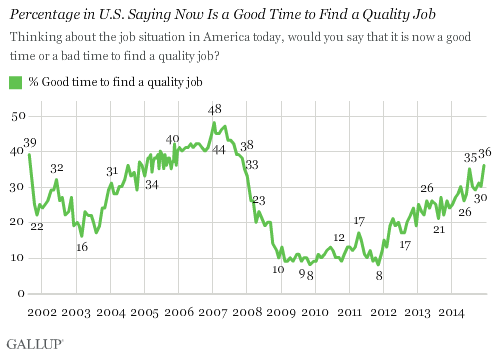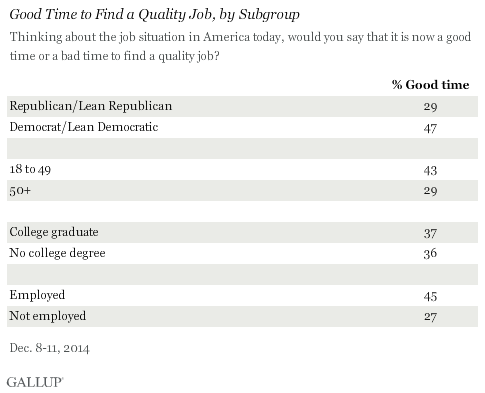Story Highlights
- In December, 36% say now is a good time to find quality job
- Quality job percentage highest since the recession
- Job market evaluations improved six points from November
WASHINGTON, D.C. -- The percentage of Americans saying now is a good time to find a quality job jumped to 36% in December, up six percentage points from November. This is by one point the highest percentage found since November 2007, prior to the start of the Great Recession.

When Gallup first asked this question in August 2001, 39% of Americans said it was a good time to find a quality job. Gallup began updating this question monthly in October of that year. The highest "good time" percentage Gallup has found since was the 48% in January 2007, while the lowest was 8% -- found several times, most recently in November 2011.
While Americans are as positive about the job market as they were in December 2007, the majority, 61%, continue to say it is a bad time to find a quality job. That has improved, however, from the 66% seen last month and the 73% in December 2013.
Among groups of Americans, younger adults continue to be more optimistic than older Americans about the quality job situation (43% "good time" vs. 29%, respectively). Possibly because there is a Democratic president, Democrats and those who lean Democratic (47%) are more positive than Republicans and those who lean Republican (29%). Gallup has previously found that views of the availability of quality jobs are linked to political views.

Americans with a college degree and those without one have similar views of quality job prospects. Employed Americans, however, are more positive about this than are those who are not employed. It is important to note that Americans who are not employed are not necessarily unemployed; they could also be retired or choosing not to work.
Implications
Americans' perceptions that now is a good time to find a quality job have returned to pre-recession levels, a sign that Americans are seeing improving job conditions. This follows a November increase in Gallup's Job Creation Index. That month, the Bureau of Labor Statistics' U.S. unemployment rate stayed just under 6%, at 5.8%. While these indicators are still not as good as what was seen prior to the start of the recession, they are much improved from 2009 to 2011, when the economy was still slowly recovering.
Survey Methods
Results for this Gallup poll are based on telephone interviews conducted Dec. 8-11, 2014, on the Gallup U.S. Daily survey, with a random sample of 805 adults, aged 18 and older, living in all 50 U.S. states and the District of Columbia. For results based on the total sample of national adults, the margin of sampling error is ±4 percentage points at the 95% confidence level. All reported margins of sampling error include computed design effects for weighting.
Each sample of national adults includes a minimum quota of 50% cellphone respondents and 50% landline respondents, with additional minimum quotas by time zone within region. Landline and cellular telephone numbers are selected using random-digit-dial methods.
View survey methodology, complete question responses, and trends.
Learn more about how Gallup Poll Social Series works.

